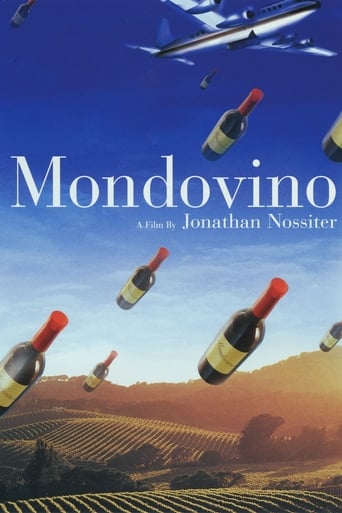yaronz
The film is annoying.Technically, there are too many times you see unfocused and very roughly edited scenes. One could easily get a cleaner film using a decent amateur camera and 100$ video editing software. Down to earth, man on the street doesn't mean sloppy editing. Unfocused scenes that don't contain important statement should have been deleted. The same goes for making sure that the object's head/hand/others stay in the frame. My 8 years old son knows that by now.The film is way too long. The main point (anti globalization) is understood after 30 minutes, why bother with all the rest. After the interview with James Suckling I pressed the "stop" button. What a waist of time.The main theme just doesn't work for me anymore. I've seen too many small wineries which produce mediocre, commercialized wines and many big wineries that produce great and unique wines. The movie identifies the small producers as the ones that are producing wines with more Identity, or terroir. The bigger ones are accused of producing "internationalized" or "commercialized" wines. The film is trying to make a black and white statement in a world full of gray tones. However, the movie hasn't proved this claim. They look at a couple of sporadic examples, "tie" some of the big producers (Frescobaldi) with fascism and provided "interviews" with key people. Well, did all the small producers spent WWII in the resistance? Is it relevant to see that Parker has a thing with Bulldogs? The movie is very manipulative and unconvincing.
Simon Peters
eddy_mercury in his comments misses the point. The film maker is regretting the standardisation of taste that has occurred because of the way in which the value of the American market in wine has led to a steady and stealthy narrowing of choice when it comes to the style of wine. Nobody would deny that the standard of wine has improved. Nobody would deny the French have been too arrogant for too long. However it is to be regretted that the American public as a whole is so sheep like in following the taste of Robert Parker. He know what he likes and the great American public, which doesn't, is happy to say "Yeah and I like it too". Unfortunately what you will end up with is less choice. Look at what passes for cheese in America, and compare it with the wealth of choice that is available still in the Old World. Do you really want wines that will be like Kraft slices compared with Brie? Trust me, not all wines have to be big tasting reds barrelled in new oak, and giving endless, unchallenging, "easy-drinking". What next - Château Yquem Lite?
P C
Business vs. personal conviction. Profit vs. art.As with any documentary that pits the capitalist large corporations against the small producer, the viewer will invariably have to take the side of one or the other based on their own believes. This is as much a documentary of the new standardized way of doing things that globalization is bringing us, against the old traditional ways where character and the art of making things matters almost more than getting the product sold.If you have to remember one thing from this movie, it is that the masses can no longer decide by themselves, they just follow the taste of one or a couple of critics that tend to equalize and standardize taste in the same way as MacDonalds used to do for the fast bite (something Parker himself admits to in the film against a backdrop of a Burger King sign). "It is all about image" against content as another interviewee says. That is the easy way, the standardized way. Easier than taking the time for a nice wine to mature, easier than to forge your own taste by trying and trying yet over again. Controlled branded taste is easier.There is a glitter of hope when even some of our cousins across the ocean agree that a few people are "levelling" the taste of wines to maximize the profits and ensure a maximum of it gets sold to the "grey masses". Individuality and difference is sacrificed for the extra buck. It is nice to see that not everything or everyone is giving in to standardization, even across the ocean.As in many other areas of today's world, dominance of a few and reduced freedom of choice impacts us all... let everyone make up their mind and decide what to go for. Too much standardization kills the mind and taste; difference brings innovation and healthy competition and will allow for choice - and not just vacuum-packed "more of the same". Standardization sells easily and a lot, and brings everyone to the same level - the lower one.On this, I am going to open up a nice bottle and wish you a hearthy "sante".
eddy_mercury
An interesting movie, but what a load of hooey! The movie completely ignores the fact that in blind tastings, French critics who dismiss the pretensions of the Napa vintners and claim to prefer the pure, natural taste of terroir, choose the American wines. This movie is about hype all right, but it's not Mondavi; its about the pretentious claim of many a traditional winery that only centuries of winemaking culture and knowledge of terroir can lead to a good product. This is about as ridiculous as the claim that good bread can only be produced in certain traditional locales, i.e., that a Parisian baguette can only be good if it is from Paris. I'm glad to say that both good bread and good wine can be found in many, many places, and more every year. And speaking from experience, the Chilean and Argentinian wines of 30 years ago were dreadful! Nothing has been lost in adopting international standards for their wine industry.
